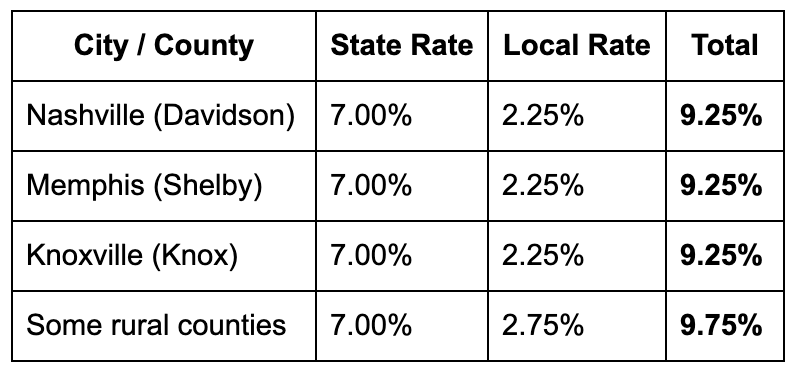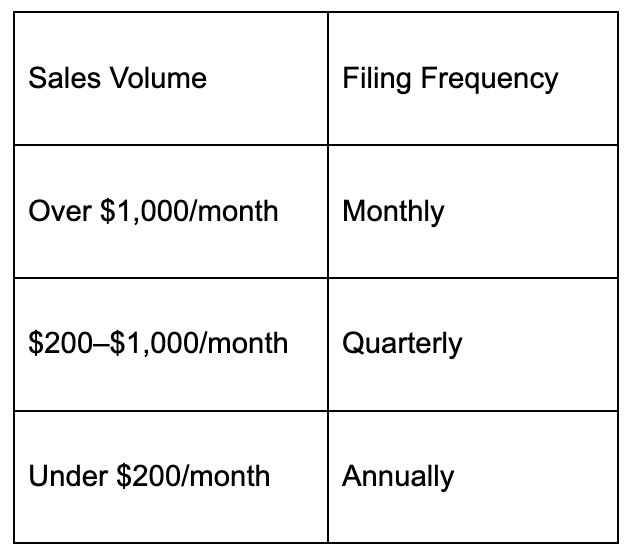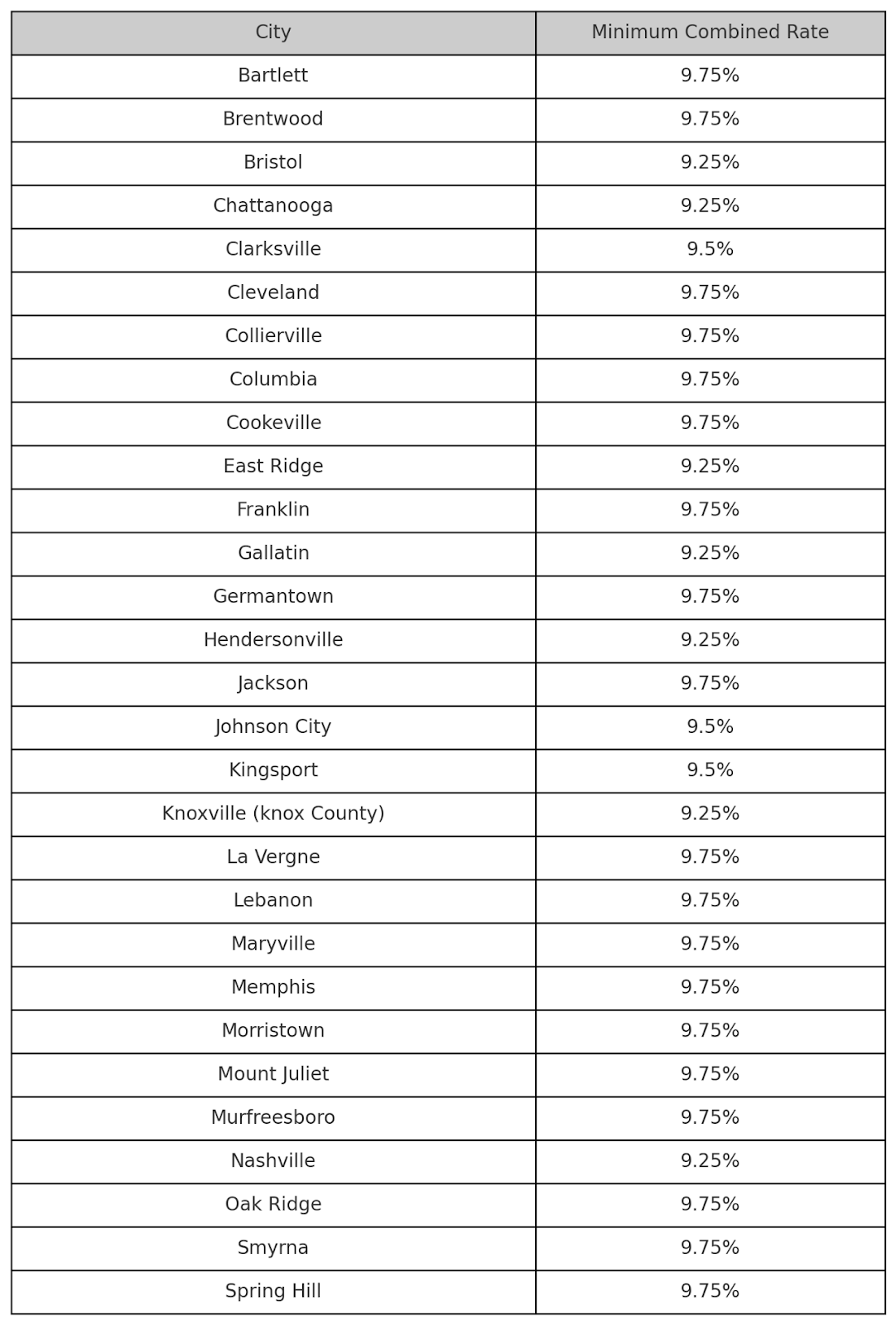Tennessee's tax system is a rare breed. While most states split their revenue between income and sales taxes, Tennessee takes a different routethere's no state income tax on wages here.
Sounds great, right? Not so fast.
To compensate, Tennessee leans heavily on sales tax, making it one of the highest in the country. From your weekly grocery run to big-ticket purchases, the Tennessee sales tax rate plays a major role in your cost of living.
And if you're a business owner? Knowing when and how to collect local sales tax is non-negotiable.
In this guide, we'll break down exactly how Tennessee sales tax works in 2025, why Tennessee doesn't have a state income tax, and what that means for your wallet, whether you're a consumer, remote worker, or entrepreneur.
If you're shopping in Tennessee, you'll quickly notice that your total at checkout is often higher than the sticker price. That's because Tennessee has one of the highest average combined sales tax rates in the U.S.
Tennessee charges a flat 7 percent state sales tax on most goods and some services. This is the base rate, applied across the board on taxable items, from electronics to household goods. But that's just the beginning.
On top of the 7% state rate, local jurisdictions (counties and cities) can impose additional local sales tax rates, which can be up to 2.75%. This brings the total sales tax in many parts of Tennessee to 9.75% or higher.
According to the tax foundation, Tennessee's combined state and local sales tax rates vary significantly depending on the county and city where you make your purchase. You can use a sales tax calculator to determine the exact rate for any specific zip code within tennessee.
Here are a few examples:

Since Tennessee doesn't have a state income tax on wages, it relies heavily on sales tax revenue to fund public services like education, transportation, and infrastructure. So while you might save on your paycheck, you pay more at the store.
Sales tax applies to tangible personal property (physical goods), including:
But not everything is taxed; we'll cover exemptions and special rules in the next section.
Tennessee is one of the few U.S. states with no state income tax, which makes sales tax a primary source of revenue. But here's the catch: the rules around what is taxed, and at what rate, can get confusing, especially for new residents or small businesses.
Let's break down exactly what's taxed, what's exempt, and what nuances you need to know in 2025.
Unlike most states, Tennessee still taxes groceries, but not at the full sales tax rate. Here's how it works:
What qualifies as "grocery food":
What doesn't qualify (taxed at full 7% + local):
Why this matters: Even though groceries are taxed at a lower rate, you could still be paying over 6.5% at checkout depending on where you live.
If you download it or stream it, chances are you're paying sales tax in Tennessee.
Taxed digital goods include:
Tennessee treats digital products much like their physical counterparts. If a printed book is subject to sales tax, the e-book usually is too, unless a specific exemption applies (like for education).
Despite its high base rate, Tennessee exempts certain items from sales tax:
These sales and use tax exemptions are crucial for businesses in healthcare, education, agriculture, or production. The state of tennessee provides specific provisions for qualifying taxpayers to claim these exemptions.
Tennessee taxes many services and non-tangible goods that are exempt in other states. This is especially important for SaaS, service-based, or digital-first businesses.
Taxable categories include:
Business tip: If you sell digital products or services to customers in Tennessee and have economic nexus, you're likely required to collect sales tax, even if you operate out of state.
Understanding tennessee tax rates requires more than just knowing the base rate. Since Tennessee uses a destination-based system, rates vary significantly across different locations.
The sales tax rate in tennessee combines:
For accurate calculations, use a tennessee sales tax calculator or lookup tool that considers your specific location. Many businesses find it helpful to reference rates by county or use online tools that provide real-time rate information.
In 2021, Tennessee made several adjustments to its tax structure. By 2022, the state had implemented new provisions affecting digital goods and services. The 2023 legislative session continued to refine these rules, particularly around sales tax on products sold through online marketplaces.
According to recent data from 2023, almost everything you purchase in Tennessee is subject to some form of sales tax, with very specific exemptions outlined in state law. Cities and counties continue to enact their own local rates within the limits set by state law.
If you're doing business in Tennessee, understanding your sales tax responsibilities isn't optionalit's foundational. Whether you're a small retailer, digital product creator, or service-based provider, the state expects you to collect and remit sales tax if certain conditions are met.
Here's what every Tennessee business needs to know in 2025:
You are required to collect sales tax in Tennessee if:
Note: Both in-state and remote sellers can trigger tax obligations due to economic nexus rules, especially post-Wayfair decision.
To begin collecting sales tax, you'll need to register your business with the Tennessee Department of Revenue. The process can be done online through their TNTAP portal.
You'll need:
Once registered, you'll receive a sales tax account number and must begin collecting and remitting tax on taxable sales.
Tennessee has a statewide base rate of 7%, plus a local sales tax rate that varies by county or city (typically 1.5% to 2.75%).
Here's how it works:
You can lookup exact rates using the Tennessee Sales Tax Rate Locator or use the sales tax calculator provided by the state.
Filing frequency depends on your monthly sales volume:

Returns are filed through the TNTAP portal and are due on the 20th of the following month after the reporting period ends.
Late filings = penalties + interest.
Certain sales qualify for sales and use tax exemptions, such as:
To claim an exemption, buyers must provide a valid Tennessee resale or exemption certificate, and sellers must keep these on file for audit protection.
Don't forget about use tax in tennessee. If you purchase goods from an out-of-state dealer who doesn't collect Tennessee sales tax, you may owe use tax on those purchases. This applies to both businesses and individual taxpayers.
Tennessee is a destination-based sales tax state, meaning you must charge the sales tax rate based on your customer's shipping address, not your business location. This matters especially for remote sellers and eCommerce businesses.
Tennessee's sales tax combines a 7% state base rate with local add-ons, which range from 2.25% to 2.75%. This means most cities fall between 9.25% and 9.75% total.
Here's a helpful overview of key Tennessee cities:

Tax rates in tennessee can change, so it's important to verify current rates using official lookup tools or a tennessee sales tax calculator before making important business decisions.
Q: What goods and services are always exempt?
A: Prescription drugs, certain medical equipment, and specific agricultural items maintain consistent exemptions statewide.
Q: How does the single article rule work?
A: Tennessee applies special rules for certain single article purchases over specific dollar amounts, particularly for luxury items.
Q: Do rates change frequently?
A: While the state rate remains stable, local rates can change as cities and counties adjust their tax policies through legislative action.
Q: What about motor vehicle purchases?
A: Motor vehicle sales are subject to specific tax rules that may differ from general sales tax provisions.
As we move through 2025, businesses should stay informed about potential changes to Tennessee's sales tax structure. The state continues to refine its approach to digital goods and services, and local jurisdictions may adjust their rates throughout the year.
For the most current information, consult the Tennessee Department of Revenue website or use their official sales tax calculator to ensure you're applying the correct rate for any given zip code.
Whether you're running a brick-and-mortar shop in Nashville or shipping products from an online store in Chattanooga, understanding your Tennessee sales tax obligations isn't optional, it's essential. With a combined state and local rate that often tops 9%, even small missteps can add up fast in penalties and missed filings.
From registering through TNTAP, to tracking economic nexus thresholds to staying compliant with due dates and exemptions, every step matters. Remember to use the sales tax rate lookup tools provided by the state and consider using a sales tax calculator for accurate calculations.
If you're feeling overwhelmed or just want to stay one step ahead of audits and errors, outsourcing your sales tax management to experts like Madras Accountancy can save time, reduce risk, and help your business scale without compliance headaches.
Let the pros handle the complexity, so you can focus on running your business.
Question: What is Tennessee's state sales tax rate and how do local add-ons affect total rates?
Answer: Tennessee's state sales tax rate is 7% in 2025, which is among the highest in the nation. Local jurisdictions can add additional sales tax, creating combined rates ranging from 8.5% to 9.75% across different cities and counties. Major cities include Nashville (9.25%), Memphis (9.75%), Knoxville (9.25%), and Chattanooga (9.25%). The high combined rates make Tennessee one of the highest sales tax states nationally. Businesses must track location-specific rates for proper collection, as rates vary significantly between neighboring jurisdictions and can change periodically based on local government decisions.
Question: How do Tennessee local sales tax rates vary by city and county?
Answer: Tennessee local sales tax rates vary significantly across municipalities and counties, with most areas having combined state and local rates between 8.5% and 9.75%. High-rate areas include Memphis/Shelby County (9.75%), Nashville/Davidson County (9.25%), and Clarksville (9.25%). Some rural areas have lower combined rates around 8.5-9.0%. Local rates include county-level taxes and municipal taxes that can stack together. Businesses operating in multiple Tennessee locations must track specific rates for each location and ensure proper collection based on delivery or pickup location. Rate changes occur periodically and require ongoing monitoring.
Question: What items and services are subject to Tennessee sales tax?
Answer: Tennessee sales tax applies to retail sales of tangible personal property, prepared food, telecommunications services, cable television, digital products, and admission to entertainment events. Taxable items include clothing, electronics, furniture, vehicles, restaurant meals, and alcoholic beverages. Services generally are not taxable except for specific services like telecommunications, cable TV, and certain digital services. Groceries are taxable at reduced rates in some areas. Software downloads, digital books, and streaming services are generally taxable. Businesses must collect tax on all taxable transactions based on customer delivery location or pickup point.
Question: What are the major exemptions from Tennessee sales tax?
Answer: Major Tennessee sales tax exemptions include most groceries for home consumption (though some areas apply reduced rates), prescription medications, medical devices, manufacturing machinery and equipment, and agricultural equipment. Professional services like legal, accounting, and consulting are exempt, as are sales to federal and state governments and qualified nonprofit organizations. Raw materials used in manufacturing, certain energy sources for industrial use, and educational materials qualify for exemptions. Businesses claiming exemptions must provide proper documentation including resale certificates or exemption certificates to suppliers.
Question: How do businesses register for Tennessee sales tax and what are ongoing compliance requirements?
Answer: Businesses register for Tennessee sales tax through the Tennessee Department of Revenue online portal, providing business information, FEIN, ownership details, and estimated tax liability. Registration is required for businesses with Tennessee nexus including physical presence or meeting economic nexus thresholds ($100,000 in sales annually). Filing frequencies depend on tax liability: monthly (over $2,000), quarterly ($200-$2,000), or annually (under $200). Returns are due by the 20th of the month following the reporting period. Maintain detailed records of sales, exemptions, and tax collections for audit purposes.
Question: What constitutes sales tax nexus in Tennessee for out-of-state businesses?
Answer: Tennessee sales tax nexus exists through physical presence including offices, warehouses, employees, inventory, or property in the state, as well as economic nexus for remote sellers with $100,000 or more in annual Tennessee sales. Marketplace facilitators must collect tax if they meet economic nexus thresholds. Click-through nexus applies to businesses with affiliate relationships generating referrals. Trade shows and temporary activities may create nexus depending on frequency and scope. Remote sellers exceeding thresholds must register and collect Tennessee sales tax even without physical presence in the state.
Question: How does Tennessee handle marketplace sales and online transactions?
Answer: Tennessee requires marketplace facilitators like Amazon, eBay, and Walmart to collect and remit sales tax on behalf of third-party sellers using their platforms. Remote sellers meeting economic nexus thresholds must register and collect tax directly. Marketplace sellers may still have filing obligations for direct sales outside marketplace platforms. Tennessee follows destination-based sourcing, meaning tax rates are based on customer delivery location. The state provides resources and guidance for marketplace sellers and remote retailers to understand their obligations and comply with collection requirements.
Question: What are the penalties for Tennessee sales tax non-compliance and how can businesses ensure compliance?
Answer: Tennessee sales tax penalties include late filing penalties of 5% of tax due (minimum $5), late payment penalties of 10% plus 1% per month, and interest charges at statutory rates. Failure to register results in additional penalties and potential criminal prosecution for willful evasion. Fraudulent activity can result in substantial penalties and criminal charges. Ensure compliance by registering promptly when nexus exists, filing returns timely, maintaining accurate records, and monitoring rate changes across Tennessee jurisdictions. Consider professional assistance for complex multi-location situations and implement systems for tracking varying local tax rates and exemption requirements.

A practical comparison of hiring a freelancer vs using a dedicated offshore accounting team, focusing on continuity, quality control, security, and scaling.

How CPA firms outsource payroll and 1099 work to reduce penalties and admin load, with a clean workflow for approvals, filings, and year-end reporting.

Practical do's and don'ts for CPA firms outsourcing accounting work, based on common failure points and what successful rollouts do differently.